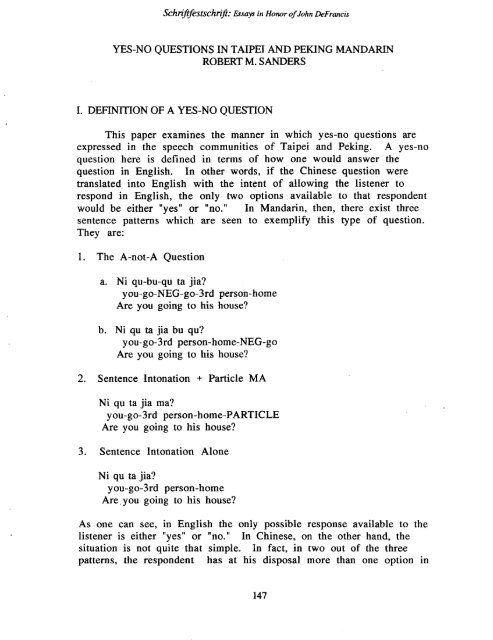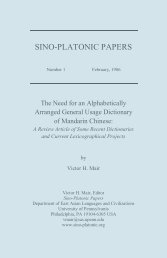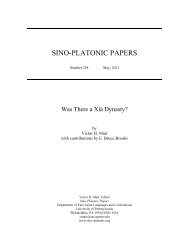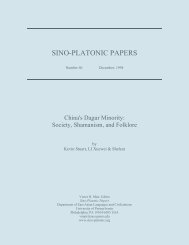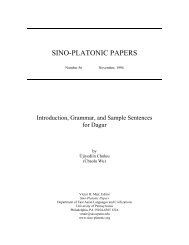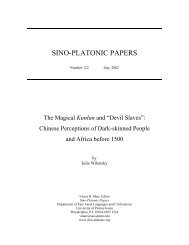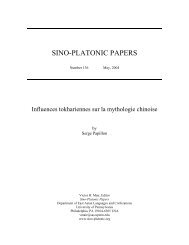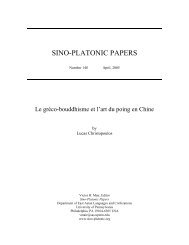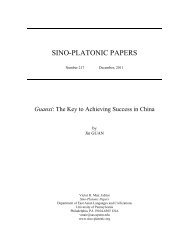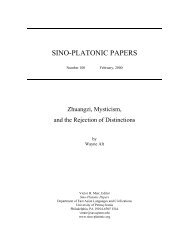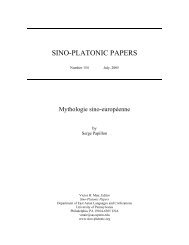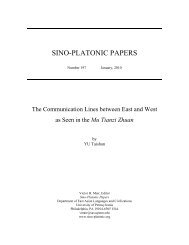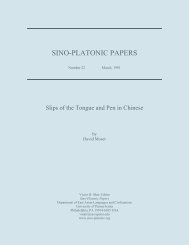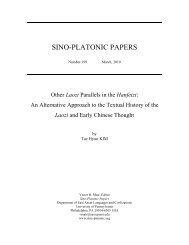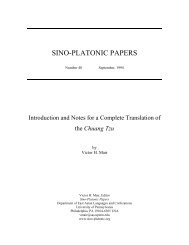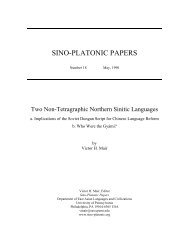- Page 1 and 2:
SINO-PLATONIC PAPERS Number 27 Augu
- Page 3 and 4:
Table of Contents Tabula Gratulator
- Page 5 and 6:
Olov B d Anderson Ivan Aymat Dayle
- Page 7 and 8:
S~hI7frfls~hc$: Essays</str
- Page 9 and 10:
Schriftfestsch~!: Essays</s
- Page 11:
Schrififestschrifl: Essays<
- Page 14 and 15:
Sino-Platortic Papers, 27 (August 3
- Page 16 and 17:
Sino-Platonic Papers, 27 (August 3
- Page 18 and 19:
Sino-Platonic Papers, 27 (August 3
- Page 20 and 21:
enhe gsidbng) : 1. 5$%&&&($3kk90 Si
- Page 22 and 23:
Sino-Platonic Papers, 27 (August 3
- Page 24 and 25:
Sino-Phonic Papers, 27 (August 3 1,
- Page 26 and 27:
Sino-Plato~zic Papers, 27 (August 3
- Page 28:
Sino-Plutonic Papers, 27 (August 3
- Page 31 and 32:
Schriftfestschnif: fisq in Honor of
- Page 33 and 34:
Schrififestschrifi: Essays<
- Page 35 and 36:
Schriffst~~hrifr: fi~rsays in Honor
- Page 37 and 38:
Schriifrestschr!: &sap in Homr of J
- Page 39 and 40:
Schrijt$estschrifr: Ervap in Honor
- Page 41:
Schnflestschrifi: Essays</s
- Page 44 and 45:
Sino-Platonic Papers, 27 (August 3
- Page 46 and 47:
Sino-Platonic Papers, 27 (August 3
- Page 49 and 50:
Schnfifeschrifi: Essap in Honor of
- Page 51 and 52:
Schnflestschriij: &says in Honor of
- Page 53 and 54:
. Schnfrfestschrifi: Essays
- Page 55 and 56:
. S~hnfffestschri fi: Essay
- Page 57 and 58:
NOTES Schriflestschrifi: fisays in
- Page 59:
REFERENCES SchrIfifists~hri!j?: Ess
- Page 62 and 63:
Sirlo-Platonic Papers, 27 (August 3
- Page 64 and 65:
Sino-Platonic Papers, 27 (August 3
- Page 66 and 67:
Sino-Plutonic Papers, 27 (August 3
- Page 68 and 69:
Sino-Platonic Papers, 27 (August 3
- Page 70 and 71:
Sino-Plutonic Papers, 27 (August 3
- Page 72 and 73:
Sino-Plutonic P ap, 27 (August 3 1,
- Page 74 and 75:
Sino-PEatonic Papers, 27 (August 3
- Page 76 and 77:
Sino-Plutonic Papers, 27 (August 3
- Page 78 and 79:
Sino-Platonic Pupms, 27 (August 3 1
- Page 80 and 81:
Sino-Platonic Papers, 27 (August 3
- Page 82 and 83:
Sino-Platonic Papers, 27 (August 3
- Page 84 and 85:
Sino-Platonic Papers, 27 (August 3
- Page 86 and 87:
Sino-Platonic Papers, 27 (August 3
- Page 88 and 89:
Sino-Plaronic Papers, 27 (August 3
- Page 90 and 91:
Sirw-Platonic Papers, 27 (August 3
- Page 92 and 93:
Sino-Platonic Papers, 27 (August 3
- Page 94 and 95:
Sino-Platonic Papers, 27 (Aupt 3 1,
- Page 96 and 97:
Sim-Platonic Papms, 27 (August 3 1,
- Page 98 and 99:
Sino-Phonic Papers, 27 (August 3 1.
- Page 100 and 101:
Sino-Platonic Papers, 27 (August 3
- Page 102 and 103:
Sim-Platonic Papers, 27 (August 3 1
- Page 104 and 105:
Sim-Platonic Papers, 27 (August 31,
- Page 106 and 107:
Sino-Platonic Papers, 27 (August 3
- Page 108 and 109: Sino-Platonic Papers, 27 (August 3
- Page 110 and 111: Sinu-Platonic Papms, 27 (August 3 1
- Page 112 and 113: Sino-Platonic Papem, 27 (August 3 1
- Page 114 and 115: Sino-Platonic Papers, 27 (August 3
- Page 116 and 117: Sino-Plutonic Papers, 27 (August 3
- Page 118 and 119: Sino-Plutonic Papers, 27 (August 3
- Page 120 and 121: Sino-Platonic Papers, 27 (August 3
- Page 122 and 123: Sino-Platonic Papers, 27 (August 3
- Page 124 and 125: Sino-Platonic Papers, 27 (August 3
- Page 126 and 127: Sino-Platonic Papers, 27 (August 3
- Page 128 and 129: Sino-Platonic Papers, 27 (August 3
- Page 130 and 131: Sino-Platonic Papers, 27 (August 3
- Page 132 and 133: Sirw-Platonic Papers, 27 (August 3
- Page 134 and 135: Sino-Platonic Papers, 27 (August 3
- Page 136 and 137: Sino-Platonic Papers, 27 (August 3
- Page 138 and 139: Sino-Platonic Papers, 27 ( Aup t 3
- Page 140 and 141: Sino-Platonic Papers, 27 (August 3
- Page 142 and 143: Sino-Platonic Papos, 27 (August 3 1
- Page 144 and 145: Sino-Platonic Papers, 27 (August 3
- Page 146 and 147: Sino-Platonic Papers, 27 (August 3
- Page 148 and 149: Sino-Platonic Papers, 27 (August 3
- Page 150 and 151: Sino-Platonic Papers, 27 (August 3
- Page 152 and 153: Sino-Platonic Pups, 27 (August 3 1,
- Page 154 and 155: Sino-Platonic Papers, 27 (August 3
- Page 156 and 157: Sino-Platonic Papers, 27 (August 3
- Page 160 and 161: Sino-Platonic Papers, 27 (August 3
- Page 162 and 163: Sino-Platonic Papers, 27 (August 3
- Page 164 and 165: Sino-Platonic Papers, 27 (August 3
- Page 166 and 167: Sino-Platonic Papers, 27 (August 3
- Page 168 and 169: Sino-Platonic Papers, 27 (August 3
- Page 170 and 171: Sino-Platonic Papers, 27 (August 3
- Page 172 and 173: Sino-Platonic Papers, 27 (August 3
- Page 174 and 175: Sino-Platonic Papers, 27 (August 31
- Page 176 and 177: Sino-Platonic Papers, 27 (August 3
- Page 179 and 180: Schniftfestschrifi: Essa)s in Honor
- Page 181 and 182: . Some women novelists or tanci (#
- Page 183 and 184: Schrififestschn$- Ersq in Horwr of
- Page 185: Schnrfjestschri!: Essays</s
- Page 188 and 189: Sino-Platonic Papers, 27 (August 3
- Page 190 and 191: Sino-Phonic Papem, 27 (August 3 1,1
- Page 192 and 193: EXAMPLE 26: Sino-Plutonic Papers, 2
- Page 195 and 196: Schrijtfiestschrifi: EFsays in Hono
- Page 197 and 198: Schny?jesstschhriff: Essay in Honor
- Page 199 and 200: Schnfffes~ch n'!: Essays</s
- Page 201 and 202: Schrifrestschn'fi: &says in Honor o
- Page 203 and 204: are in the same academic department
- Page 205 and 206: Schnfifestschhriji: &says in Honor
- Page 207 and 208: Schnftfeschrif: Essays</str
- Page 209:
' Schnjifestschn'fi: Essay in Honor
- Page 212 and 213:
etc. Sine-Platonic Papers, 27 (Augu
- Page 214 and 215:
Sim-P2arorzic Papers, 27 (August 3
- Page 216 and 217:
Sino-Platonic Papers, 27 (August 3
- Page 218 and 219:
Sino-Plutonic Papers, 27 (August 3
- Page 220:
Sino-Platonic Papers. 27 (Au,oust 3
- Page 224 and 225:
Sirw-Pkrunic Papers, 27 (August 3 1
- Page 226 and 227:
Sino-Plutonic Papers, 27 (August 3
- Page 228 and 229:
Sino-Phronic Papers, 27 (August 3 1
- Page 230 and 231:
Sino-Platonic Papers, 27 (August 3
- Page 232 and 233:
Sino-Plutonic Papers, 27 (August 3
- Page 234 and 235:
Goals and Objectives for Cultural I
- Page 236 and 237:
Sino-Platonic Papers, 27 (August 3
- Page 238 and 239:
Sim-Platonic Papers, 27 (August 3 1
- Page 241 and 242:
Schnffestschri!: f isq in Honor of
- Page 243 and 244:
Schn@fiestscchrijl: Essays<
- Page 245:
enjoy a much better link with the s
- Page 248 and 249:
Sino-Platonic Papers, 27 (August 3
- Page 250 and 251:
Sino-Platonic Papers, 27 (August 3
- Page 253 and 254:
Sch?iftfestschrij?: fisays in Honor
- Page 255:
A translation of the quadrisyllabic
- Page 258 and 259:
Number 1 2 3 4 5 6 7 8 9 10 1 1 12
- Page 260:
Number 23 24 25 26 Date 9 1/7/4 911


